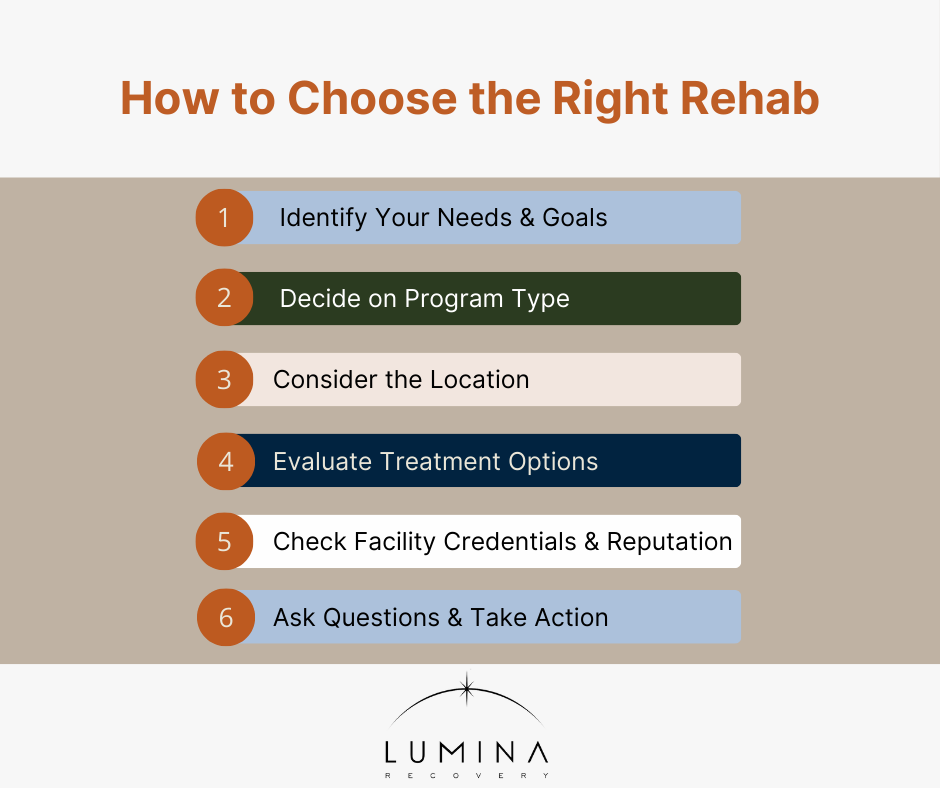Deciding to seek help for addiction is one of the most important steps on the path to recovery. With so many options available, choosing the right rehab facility can feel overwhelming. While addiction rehab centers offer comprehensive care, understanding key factors simplifies the decision. From inpatient to outpatient treatment, understanding these differences helps align your choice with your recovery goals.
Careful research and consideration are essential in finding the best drug rehabilitation centers. Factors such as location, treatment approaches, facility accreditation, and program offerings all play a crucial role in long-term success.
Whether you need medical detox, therapy, or a dual diagnosis program, selecting a rehab that provides the right combination of services is essential. This guide will walk you through the key steps in choosing a rehab facility that meets your needs and sets the foundation for lasting sobriety.

Step 1: Identify Your Needs and Goals
Before choosing a rehab drug center, take time to assess your situation. Addiction affects people differently, so the right program should match your specific needs. Ask yourself:
- What substances or behaviors do I need help with?
- Do I have any underlying mental health issues requiring dual diagnosis treatment?
- What are my personal recovery goals?
The best addiction treatment centers offer personalized care tailored to different types of addiction and co-occurring disorders. If you’re unsure, consider speaking with a professional who can guide you in understanding what level of care is best suited for your situation.
Step 2: Decide on Program Type
Rehab programs vary in structure and intensity. Understanding the differences can help you make an informed choice when looking for the best rehab facilities:
- Inpatient Rehab – This is a residential program where individuals stay at the facility for 30, 60, or 90 days. It provides 24/7 medical care and structured treatment, making it ideal for those with severe addictions.
- Outpatient Programs – These programs allow patients to live at home while attending scheduled therapy sessions. Intensive outpatient programs (IOP) and partial hospitalization programs (PHP) offer flexible care.
- Detox Services – If physical dependence is present, medical detox at treatment centers for addiction may be necessary before starting a rehab program.
The right choice depends on the severity of addiction, personal responsibilities, and financial considerations. The best rehab center for you will align with your specific recovery goals.
Step 3: Consider the Location
The location of a rehab drug center can impact your recovery experience. Some people prefer a local facility for easier access to family support, while others benefit from a change of environment. Consider:
- Proximity to home – Staying close may help with family involvement in therapy sessions.
- Distance for privacy – Traveling for rehab can provide a fresh start away from triggers and stressors.
- Surroundings – Some prefer the best rehab facilities near nature or in serene settings to promote relaxation and healing.
Think about what setting will best support your recovery process. Many top-rated alcohol treatment centers are located in peaceful environments designed to encourage healing.
Step 4: Evaluate Treatment Options
Different rehab centers use various treatment methods. Look for programs that offer evidence-based therapies, including a combination of traditional and holistic approaches to recovery:
- Cognitive Behavioral Therapy (CBT) – Helps individuals recognize and change harmful thought patterns.
- Dialectical Behavior Therapy (DBT) – Focuses on emotional regulation and stress management.
- Medication-Assisted Treatment (MAT) – Uses FDA-approved medications to ease withdrawal and cravings for opioid or alcohol addiction.
- Holistic Approaches – Some of the best substance abuse treatment centers incorporate yoga, meditation, or art therapy as complementary treatments.
- Dual Diagnosis Treatment – If mental health disorders are present alongside addiction, a dual diagnosis program can provide integrated care.
The best drug rehabilitation centers offer a combination of these treatments tailored to each patient’s needs.

Step 5: Check Facility Credentials and Reputation
Not all rehab centers maintain the same level of care. It’s essential to verify their credentials, staff qualifications, and success rates to ensure high-quality treatment. Here’s what to look for:
- Accreditation – The best drug treatment facilities should be accredited by organizations like The Joint Commission or CARF (Commission on Accreditation of Rehabilitation Facilities).
- Licensed Staff – Ensure therapists, doctors, and counselors are certified in addiction treatment.
- Success Rates – While recovery varies for everyone, look for centers with positive reviews and testimonials from past clients.
- Amenities and Comfort – The best rehab facilities offer amenities that enhance the recovery experience. These may include private or shared rooms, fitness centers, nutritional support, outdoor spaces, and wellness activities like yoga and meditation.
- Aftercare Planning – Ongoing support after rehab, such as alumni programs or relapse prevention strategies, can enhance long-term success.
When searching for the best drug rehab centers, ensure they meet high standards of care and have a strong reputation for helping individuals achieve lasting recovery.
Step 6: Ask Questions and Take Action
Once you’ve narrowed your options, contact the rehab center and ask important questions:
- What therapies do you offer?
- What are the program costs and insurance options?
- What is the daily schedule like?
- How do you handle relapse prevention?
- What support is available after treatment?
If possible, schedule a tour or speak with admissions staff to get a feel for the facility’s environment. When you find the right fit, take the next step and begin the admission process.
Begin Your Path to Recovery With Lumina Recovery
Choosing the right rehab requires careful thought and research. By assessing your needs, exploring treatment options, and verifying facility credentials, you can make an informed decision that sets you or your loved one on the path to healing.
At Lumina Recovery, we offer different inpatient and outpatient options to suit your needs. As one of the best rehab centers, our comprehensive approach ensures you receive personalized care tailored to your recovery journey.
Take the first step toward lasting change—contact Lumina Recovery today to learn more about our programs and start your healing process.


